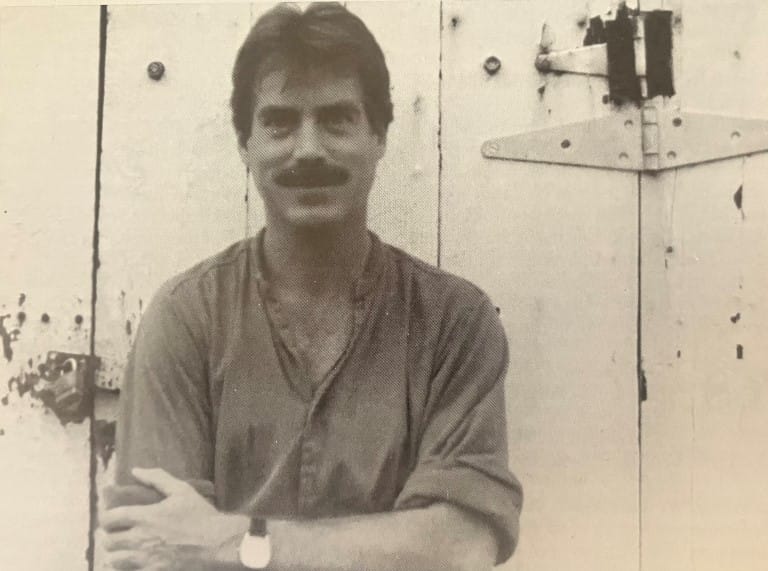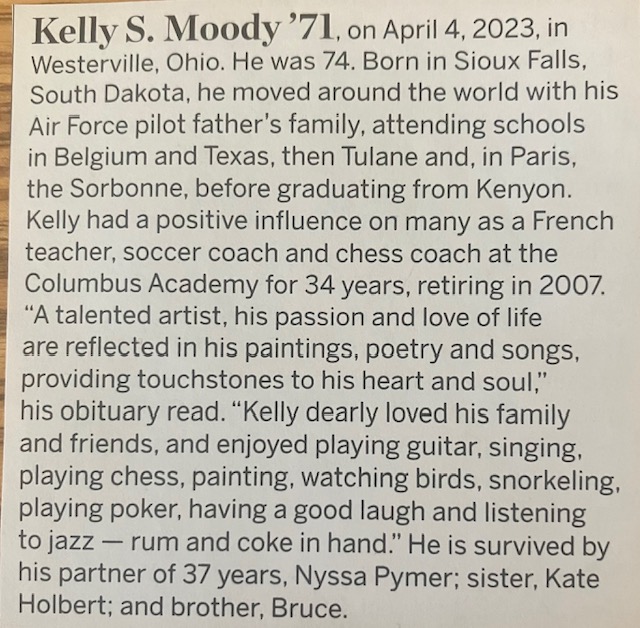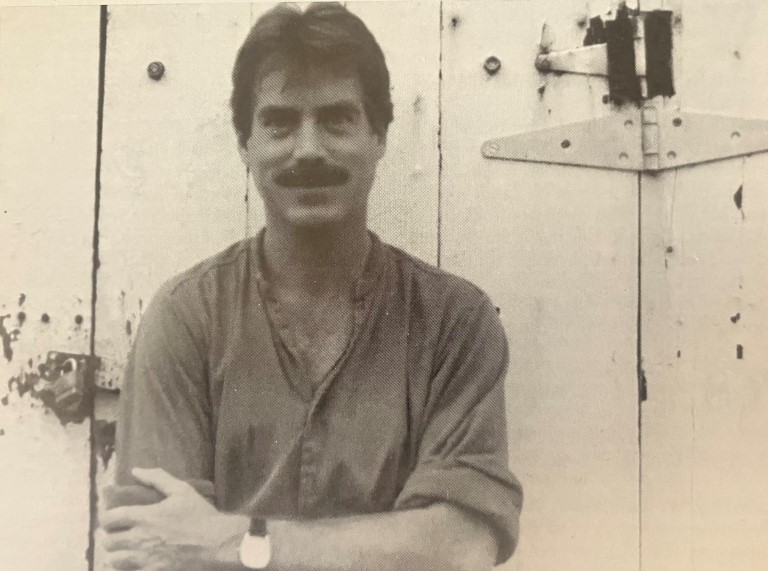Kelly Moody, une fois de plus

The other day, flipping through a stack of issues of the Kenyon College Alumni Magazine, I saw the obituary of my high school French teacher, Kelly Moody. I knew he had passed - it was more than a year ago. I have written about Kelly before, more than once. And so long ago that I had forgotten, I wrote up a full profile of him for that same alumni magazine. Yet I’ve found myself thinking about him again, or more properly his class, and decided that topic deserves one more round.
Some of this will be repetitive. I don’t care.
The bit of the obituary dedicated to his teaching says only, “Kelly had a positive influence on many as a French teacher, soccer coach and chess coach at the Columbus Academy for 34 years, retiring in 2007.” It says a bit more about his other interests: painting, poetry, jazz, playing guitar. I knew about some of those things, too.

As obituaries go, it shows care, but it’s short and misses a lot. Especially, it understates his painting career. More to the point, though, that phrase a positive influence on many utterly fails to capture the man I remember.
When I mentioned Kelly’s French class in my essay about encountering Guernica, I wrote that “it was in reality a class about art and literature that happened to use French as the vehicle.” I don’t know, I kind of dashed that off at the time without thinking too much about it. I have since concluded that was more true than I understood even a few weeks ago.
I mean, why do you study French, growing up in Ohio? Well, you don’t anymore; Columbus Academy booted it from the curriculum, possibly coinciding with Kelly’s retirement. That may have been a reaction to market pressures. There are more “useful” languages - Spanish, to name one at random - not to mention a crowd of non-European languages doubtless demanding attention: Arabic, Chinese, Japanese. The premier private school in Columbus, Ohio - that’s how they bill themselves these days, ugh - currently offers five levels each of Spanish, Chinese, and Latin. I suppose they wouldn’t be able to look themselves in the mirror without offering Latin.
That’s not what I’m asking, though. Why do you study French, in Ohio, in 1982? Because you might move to Quebec? They don’t even speak real French there, come on, and they mumble so much you can’t understand the few actual French words they might accidentally use. Because you might go to Paris? Well, fine - but why go to Paris? To look at art, to indulge in baguettes and escargot? Why do those things? It’s “why” all the way down.
Kelly Moody’s French class was a class in asking and answering those questions. As I said, I didn’t realize that at the time. None of us did. We thought we were learning how to conjugate devoir (irregular, but preferable to il faut que which requires the subjunctive, dammit), or which verbs use être in the passé composé.
Nah. Sleight of hand.
I mean, yes, we had to slug through those things, especially as sophomores I imagine. Sooner or later, though, we got around to Candide, and La Symphonie pastorale, and Jacques Prévert. Did we talk about Andre Gide’s use of the subjunctive? I don’t remember that. We talked about blindness. We watched the film and talked about the portrayal of the ending. We discussed what it means to cultivate one’s garden, and what Voltaire really believed - as well as the publisher’s decision to excise a scene where some character got half his ass shot off. (If I recall correctly, M. Moody brought in the censored portion.)
And that wasn’t even the point, the point was that this is what you do, as a person, as a grown-up. You engage with art and literature. You debate the meanings of things, of choices. You do it in a way that’s thoughtful and attentive to detail. You do it in a way that’s respectful. I can’t remember that he ever talked down to us.
Even the class meetings that were totally off the wall, the ones where we would cook breakfast and talk about how baguettes are superior to American bread - this is what adults do, too. They enjoy each other’s company. Sometimes let their hair down and take in the pleasures of this life for forty minutes.
In the post at the first link above, I referred to a series of impossibly stupid films that the school kept around for days when a class needed a change of pace, or when a substitute was left without lesson plans. We would hoot at atrocious acting of idiotic dialogue, M. Moody leading the way. It would be easy to look at those classes and say they were at best wasting time, at worst undermining the serious approach to study that is the hallmark of the premier private, etc.
Or, you could say - I would say - that along with some marginal improvement in our listening comprehension, some of us got the lesson: This is beneath you. You can as easily study French reading great literature and watching Buñuel as you can watching morons go on a picnic.
And why do you study French? Why, at 58, am I (in my way) studying Spanish? We didn’t know in the 1980s how quickly we were racing toward a Star Trek future where everyone can understand everyone, thanks to magical devices in our ears, but I’m not sure even that, back then, practicality was the point, the curriculum experts at the Columbus Academy be damned. You study - eh, I study - languages because they’re the key to culture. OK, a key, maybe, but the big one. Other cultures and our own. Someone teaches you the phrase “no olvides que” in the subjunctive, and you discover the element of doubt in Spanish-speaking cultures against the certainty of our own. And the possibilities of the world become a little more endless.
It is funny to me, forty years later, pondering the “positive influence” of Kelly Moody. Why, of the teachers I recall, he would rank among the first tier, when there’s almost nothing tangible that I learned in those second-period classes that ever proved useful. (Hell, the nuns at Nôtre Dame chose not to understand me when I finally did get to Paris.1) Of the French classes I recall, an awful lot of it would be categorized as a negative influence by the sort of people who use the phrase “positive influence.”
But that’s kind of the thing, you know. There are people in the world who want you to make practical choices. I was lucky enough to have Kelly Moody telling me, “There’s more than this.”

I should also confess that I had to look up every bit of the French grammar mentioned in this post, as well as getting some help with the title. ↩